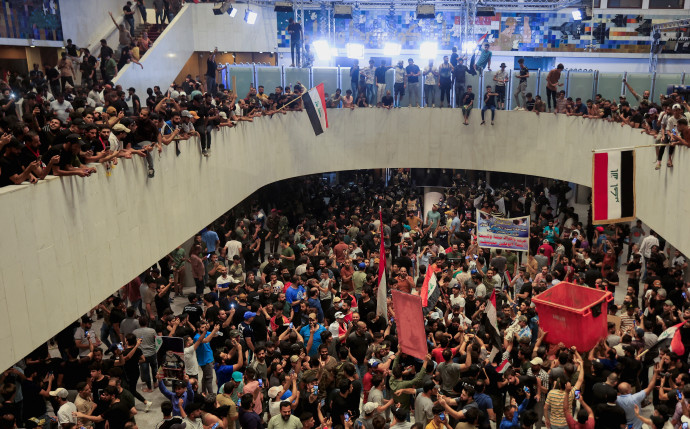Supporters of Iraqi populist leader Moqtada al-Sadr erected tents and prepared for an open-ended sit-in at Iraq's parliament on Sunday, in a move that could prolong political deadlock or plunge the country into fresh violence.
Thousands of the Shi'ite Muslim cleric's loyalists stormed into the fortified Green Zone in Baghdad on Saturday, taking over the empty parliament building for the second time in a week as his Shi'ite rivals, most of them close to Iran, try to form a government.
"We're staying until our demands are met. And we have many demands," a member of Sadr's political team told Reuters by phone, speaking on condition of anonymity because he is not allowed to give statements to the media.
"We're staying until our demands are met. And we have many demands."
Member of Sadr's political team
Sadr's social-political Sadrist Movement is demanding that parliament be dissolved, new elections be held and federal judges be replaced, the Sadrist official said.
The current protests broke out last week and have continued through the weekend. The government has set up concrete barriers in an attempt to control the protests; reports say the government has used water cannons.

In addition, Nouri Al-Maliki, leader of the pro-Iran Islamic Dawa Party, was photographed waving around an M-16, illustrating that the whole affair could lead to bloodshed.
Sadr movement
Sadr continues to ride the wave of popular opposition to his Iran-backed rivals, saying they are corrupt and serve the interests of Tehran, not Baghdad.
The mercurial cleric, however, maintains a firm grip over large parts of the state, and his Sadrist Movement has long run some of the most corrupt and dysfunctional government departments.
While Sadr does enjoy a large amount of support in the country, he has been frustrated at attempts to form a government – and has seen pro-Iran parties take advantage of the chaos.
On Sunday afternoon, Sadr issued a statement calling on all Iraqis, including security forces, to protest and demand reform, calling recent protests in Baghdad's Green Zone the "first stage" and a "golden opportunity for all those stung by the fire of injustice, terrorism, corruption, occupation and dependency."
Sadr referenced a past protest by his supporters in the Green Zone in 2016, saying he hopes the "tragedy of missing the first golden opportunity" will not be happen again.
The Sadrist Movement
The Sadrist Movement came first in an October election as the largest party in parliament, making up around a quarter of its 329 members.
Iran-aligned parties suffered heavy losses at the polls, with the exception of former Prime Minister Nouri al-Maliki, an arch-rival of Sadr.
Sadr failed to form a government free of those parties, however, beset by just enough opposition in parliament and federal court rulings that stopped him from getting his choice of president and prime minister.
He withdrew his lawmakers from parliament in protests and has since used his masses of mostly impoverished Shi'ite followers to agitate through street protests.
Iraq crises
The deadlock marks Iraq's biggest crisis in years. In 2019, Iraqi Prime Minister Adel Abdul-Mahdi resigned after massive protests, in which demonstrators were killed by pro-Iranians. Mustafa al-Kadhimi, Iraq’s current prime minister, has tried to bring stability to the beleaguered country.
Iraqis suffering from a lack of jobs and services took to the streets demanding an end to corruption, new elections and the removal of all parties - especially the powerful Shi'ite groups - that have run the country since the U.S.-led invasion that toppled Saddam Hussein in 2003.
In 2017, Iraqi forces, together with a US-led coalition and Iranian military support, defeated the Sunni Muslim extremist Islamic State group that had taken over a third of Iraq.
Government forces and Shi'ite militiamen shot dead hundreds of protesters.
Seth J. Frantzman contributed to this report.
